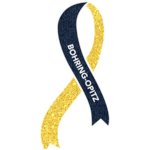Bohring-Opitz Syndrome Awareness Day Date in the current year: April 6, 2026
 Bohring-Opitz Syndrome Awareness Day, also known as BOS Awareness Day, is observed annually on April 6. It was created to raise awareness of an extremely rare genetic disease with fewer than 300 reported cases worldwide.
Bohring-Opitz Syndrome Awareness Day, also known as BOS Awareness Day, is observed annually on April 6. It was created to raise awareness of an extremely rare genetic disease with fewer than 300 reported cases worldwide.Bohring-Opitz syndrome (BOS) is a rare genetic disorder caused by a mutation in the ASXL1 gene. It was first described in 1999, but it took twelve more years to identify the gene responsible for the disorder. Most cases of Bohring-Opitz syndrome result from new mutations, although there have been several cases where the altered gene was inherited from the unaffected mother. None of the individuals diagnosed with BOS has been known to have children of their own because the majority of those affected die in childhood, and those that survive have severe developmental delay.
Most BOS cases have been documented in Western countries, with less than a dozen cases recorded in Asia (China, Japan, South Korea, India, and Turkey). However, this doesn’t necessarily mean that the syndrome is more prevalent in the West; it is highly likely that BOS cases simply go undiagnosed in countries with poor access to healthcare services.
The common symptoms of BOS are low birth weight, characteristic facial features and posture, feeding difficulties, silent aspiration, failure to thrive, developmental delay, sleep apnea, brain abnormalities, abnormal hair density and excessive hair growth, and recurring respiratory infections. Respiratory infections, obstructive apnea and unexplained bradycardia are the leading causes of death in children with BOS.
Since Bohring-Opitz syndrome is extremely rare, many families affected by BOS feel alone with what they’re going through. This is why it is so important to connect families of BOS patients with each other through support groups and assistance programs, provide them with up-to-date information about the ways to improve the lives of BOS patients, raise awareness of BOS in the medical community, and support BOS research.
BOS Awareness Day was launched in 2015 by Taylor Gurganus. Gurganus is a co-founder and the vice chair of the BOS Foundation, a nonprofit dedicated to improving the lives of people living with BOS and their families through awareness initiatives, advocacy, assistance programs, education, and research. She chose the date of April 6 to commemorate day when the first BOS Support Group was formed on Facebook.
The awareness ribbon for BOS is gold and denim. Blue denim has long been associated with rare diseases because of the wordplay “genes / jeans” (although not all rare diseases are genetic in origin, nearly 80% of them are), and the color gold was chosen by parents from the BOS Support Group because children with BOS often like shiny objects.
You can observe BOS Awareness Day by wearing an awareness ribbon, learning more about Bohring-Opitz syndrome, joining an in-person or online BOS awareness event, donating to the BOS Foundation, and spreading awareness on social media with the hashtags #BohringOpitzSyndromeAwarenessDay and #BOSAwarenessDay.
- Category
- International Observances
- Tags
- Bohring-Opitz Syndrome Awareness Day, BOS Awareness Day, international observances, awareness days, rare diseases